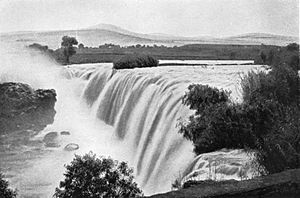Juanacatlán Falls facts for kids
The Juanacatlán Falls (Spanish: El Salto de Juanacatlán) is a famous waterfall on the Santiago River in the Mexican state of Jalisco. It was once so grand that people called it the Niagara of Mexico. Sadly, the river's flow has greatly decreased, and the falls are now almost gone.
Contents
Juanacatlán Falls: A Story of Change
About thirty years ago, the falls were clean and beautiful. Many tourists came to visit this amazing natural wonder. It was even the first Mexican landscape to appear on a postage stamp in 1899.
From Power to Pollution
At the start of the 1900s, the Juanacatlán Falls were very important. They provided hydro-electric power for the city of Guadalajara. The water also powered a cotton and woolen mill. Today, only the ruins of this mill remain.
The area around the Santiago River is now a very busy industrial zone. Since 1994, many factories have been built here. Unfortunately, these factories often dump their waste into the river. This has turned the once-majestic falls into a small stream of dirty, bad-smelling water.
Health Concerns for Locals
The pollution in the Santiago River has caused serious health problems for people living nearby. Many have become sick because of the toxic chemicals and garbage in the water. Some have even died.
One sad story is about a boy named Miguel Angel Lopez Rocha. He was playing with friends and accidentally fell into the river. He died 18 days later from arsenic poisoning. The river has been found to have 400 times more arsenic than is considered safe.
People in nearby towns like El Salto also suffer from breathing problems. This is because toxins from the river spread into the air. There have been reports of serious illnesses like Leukemia and Cancer in the area. Government health records also show high rates of breathing diseases and kidney failure in El Salto.
Efforts to Clean Up
Fortunately, there are efforts to clean up the river. The Mexican government recently built a large treatment plant near El Salto. This plant helps remove some of the foam from the river. However, it does not remove all the heavy metal waste.
Even so, the amount of arsenic in the river has gone down. The government believes it would cost a lot of money, about $873 million, to fully clean the Santiago River. In February 2020, the government of Jalisco started an investigation. They are looking into where the heavy metals and other pollutants in the river are coming from.
See also
 In Spanish: Cataratas de Juanacatlán para niños
In Spanish: Cataratas de Juanacatlán para niños
 | Georgia Louise Harris Brown |
 | Julian Abele |
 | Norma Merrick Sklarek |
 | William Sidney Pittman |


